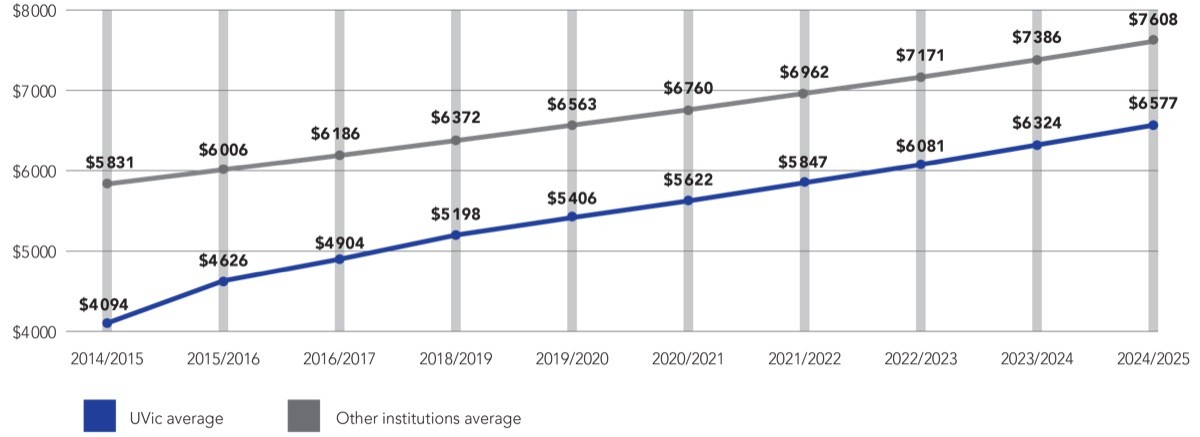The University of Victoria is proposing a 10-year plan to increase residence fees on campus in order to fund deferred maintenance expenses and the construction of a new 600-bed residence tower.
“We started looking into the state of our residence building a few years ago,” said Kathryn MacLeod, Director of UVic Residence Services. “I believe very strongly that the university has to put money into the older buildings. They could become unsafe.”
If approved by the Board of Governors, the proposed 10-year plan will begin with a 13 per cent increase, hiking fees from $4 094 to $4 626 in the 2015-16 academic year. The increases will then continue to rise at 6 per cent in 2016–17 and 2017–18, and at 4 per cent for the remaining six years of the plan. These increases will not be applied to the meal plans on campus.

According to MacLeod, the proposal looks at residence buildings “very holistically,” taking into account not only major “life-safety issues,” such as restoring old, rotting balconies and railings, and providing seismic upgrades to ensure earthquake safety, but also issues like siding, windows, and the replacement of worn rugs and old paint. “[We looked at] everything from small projects to multimillion dollar projects.”
Paralleling the issue of deferred maintenance is the increased demand for rooms on campus. This year alone, Residence Services had 5 000 applicants for regular dorm rooms. “We have half that many beds,” MacLeod explained, “so in the UVic Strategic Plan there’s been a goal to increase the number of residences.”
Residence Services hopes that these increases will allow for the construction of the proposed 600-bed residence tower over the next four or five years. “We’re just barely meeting the needs of the students on campus,” MacLeod said. “This year, the first-year guarantee took up 93 per cent of the beds in residence,” leaving approximately 150 beds for second-, third-, and fourthyear students.
In a backgrounder on the proposed increases, the UVSS questions why students are being asked to pay for deferred maintenance and the proposed tower on top of their current rental costs: “The university should be working to lower barriers to education, not increase them.”
According to MacLeod, all of the rental fees go into the operating, maintenance, and staffing costs. “We’re considered an auxiliary operation. There’s no money from elsewhere,” MacLeod explained. “Governments don’t fund residences.”
Via email, UVSS Director of External Relations Greg Atkinson stated, “The UVSS agrees that more residences should be built, but takes issue with current students having to pay for future buildings.”
Compared to universities of the same size, UVic’s residence fees rank among the lowest in the country. “This year, our average is about 25 per cent less than the average across the country,” MacLeod said.
Projecting an average yearly increase of 3 per cent onto the fees of comparator institutions, UVic expects to remain among the lowest. “We’re still going to be about 14 per cent less than everybody else,” she said.
“I don’t think comparison with other institutions is very useful,” said Atkinson. “We could be beating every other university in Canada in terms of price while remaining vastly unaffordable. A more useful comparison might be one with the average rates in Victoria.”
According to Atkinson, the monthly cost of a single room at UVic is $525, the same amount that he paid for his first apartment in Victoria, which included amenities that residence lacks, such as a private bathroom, kitchen, and living room. “After a 13 per cent increase, residence students will be paying $600 for less than what I got for $525.”
Affordability is a huge concern for the UVSS, particularly when the middle- and low- income students who need affordable housing the most are being forced to move further from campus, and face an increased likelihood of dropping their programs due to rising fees.
“Finding affordable living is essential if students plan to complete their education,” Atkinson said. According to Atkinson, the average full-time student at UVic pays $2 738 a semester in tuition and $2 100 in rental fees, for a total of $4 838 a term; however, Canada/B.C. Integrated Loans and Grants cap at $5 120, “leaving students with only $282 for books, groceries, school supplies, and other living expenses.”
MacLeod also considers issues surrounding student-affordability: “Affordability for higher education is always an issue. You can’t deny that and certainly it’s something the University really cares about and is really aware of.”
The UVSS has already brought their concerns to the administration and to Residence Life. “We plan on presenting to the Board of Governors,” said Atkinson, “but really want this to be student-led.”
“We hope that the University has students’ interests at heart and recognizes why these fee increases will create yet another barrier for students,” said Atkinson. “Affordable residence space is key for students who are coming to UVic.”
The UVSS will hold an open meeting in the SUB Upper Lounge on Jan. 22 at 2:30 p.m. to discuss how students want the UVSS to respond to the proposed increases.







